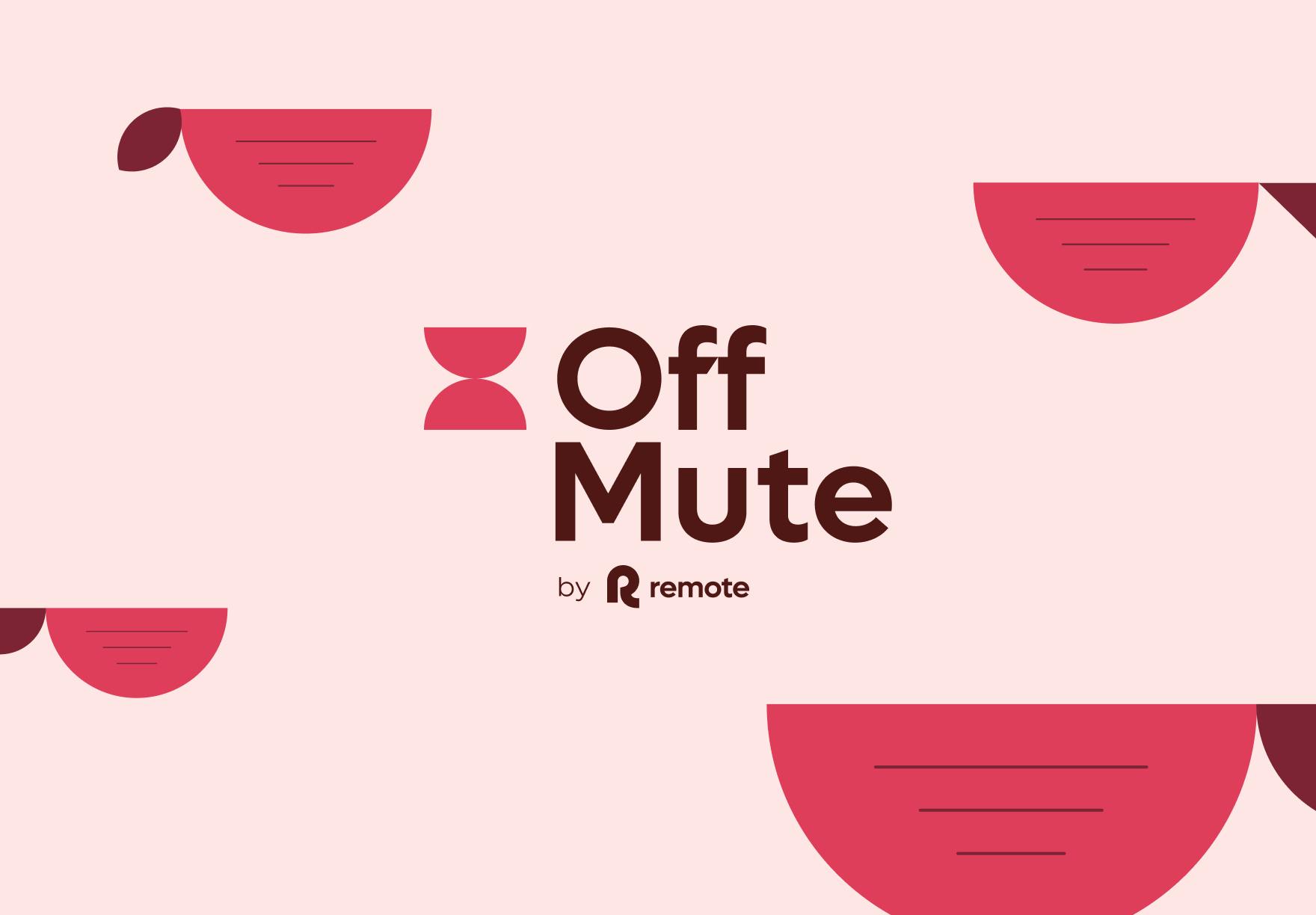
Global HR — 8 min

Podcast — 23 min
Not all companies hiring remotely know how to keep those remote teams connected. If your team is distributed across countries and time zones, how do you ensure culture isn’t lost in translation?
In this episode, HiBob COO Ze’ev Rozov joins the show to discuss how to keep your people at the center of your growth. As one of the top HR software companies in the global market, HiBob was named one of the best inventions of the year by Time in 2022.
In this conversation with Remote CEO Job van der Voort, Ze’ev talks about the impact of Gen Z in the workforce; how to empower women in tech; better ways to measure productivity on remote teams; and how to create more flexible organizations. Ze’ev and Job also look to the future to discuss how AI is changing the world of global HR.
Job: Hi, I'm Job, CEO and founder of Remote, and this is Off Mute: the podcast that explores managing distributed teams across the globe.
In today's episode, I'm talking to Ze’ev Rozov from HiBob. HiBob is an HR tool with a modern twist, enabling it to feel more like a social network to keep your staff engaged.
In 2022, Time Magazine named the tool as one of the best inventions of that year.
We covered so much ground in this chat exploring how modern companies retain and manage people and what has changed the last few years for companies with regards to HR.
I learned so much from my chat with Ze’ev, and I really enjoyed getting to know him, and I think you're going to enjoy our conversation too.
Ze’ev, thank you so much. First off, you've had a distinguished career of working in tech for over 25 years. What led you to actually move into HR and the challenge at HiBob?
Ze’ev: Well, I was a HiBob user at my previous company as COO of Minute Media. We used HiBob, I knew the company previously, knew the founders and was very impressed with the product itself.
We also went through both significant growth, scale up and multiple acquisitions and the ability to integrate it all, five companies, different parts of the world and doing that well was something super impressive.
I actually decided to leave Minute Media about a year and a half ago because I was looking at starting a new venture in the Web3 world and one of the people I was talking to was Ronni, the founder of HiBob, which I'd known from a previous world.
And when telling him what I was thinking about, he said, “Listen, I'm thinking of bringing on board a COO. I know you are thinking of starting another venture, but just give me a chance. Go talk to my management team, talk to my board and let me know what you think.”
After about a week of conversations, I realized I was spending more time thinking about HiBob and HR than about my own venture. So, I contacted my co-founder and told her, “Listen, I've actually found something that I'm more enthusiastic about. I'm not going to go start a new venture.”
The real reason behind it is I think that the world of work, it sounds like a cliché but it's really changing. And at Minute Media, one of the areas I was very involved with was our talent development and particularly looking at how do we develop diverse talent. I was kind of the executive sponsor of a group empowering women in tech and just realizing some of the challenges there.
And I really thought there's nothing more fascinating right now than addressing and creating more opportunities for more equitable growth in the way people work, in the way we manage people and so forth. As always, it starts by having systems that enable you to do that. So, that's what attracted me to get into the HR tech space.
Job: That's great. And so, you said you were very impressed. For the naive listener, what is HiBob exactly, because you mentioned it's one of these systems.
Ze’ev: Yeah, so HiBob develops core HR platform with everything around it that you need to manage people from culture, engagement, reviews, retention, growth of your people. So, everything that has to do with managing people within an organization.
What we believe sets us apart is, first of all, we're very focused on companies that have a modern mindset. This means these are companies at their core asset value is about their people.
It's not about their inventory or their factories, it's about the people and they recognize how important to their success is creating, building and nurturing that culture, especially in the world we are right now where you've got hybrid and remote, et cetera.
We focus on what we call mid-size businesses. So, these could be companies from about 100 employees over to 1,000, 2,000, 3,000, which is, if you look at it, that's a true growth engine of the economy. That's where most innovation happens.
We're not in the real SME side and we definitely do not have aspirations to go all the way to the enterprise, but we are in the most exciting part of the economy that deals with changes, recognizes the opportunities as faster moving, very demanding as customers, but also for us the most exciting area to be in.
Job: That's great. And you alluded to this already, but of course the last few years that landscape, what it means to be a modern company, has changed quite significantly. And so, what did HiBob have to do over the last few years to support and work with customers that are now suddenly fully remote or hybrid or hybrid in five different flavors?
Ze’ev: I'll take a step back maybe talking about business in general and then specifically about HiBob.
Job: Sure.
Ze’ev: So, I think the main thing we had to learn as business leaders is to be far more humble about our ability to forecast what's coming than where we thought we were.
Very few people predicted the impact of the pandemic and then the tremendous growth and then the great resignation and then reacting to a slowdown and a recession and who knows what's going to happen next.
So, the first and foremost thing is let's recognize that our ability to focus what's going to come down the road is far less accurate than anyone thinks they do. What that means is you need to build the flexibility in your system and in your organization to accept, acceptance is important and then address the fact that things are going to change.
I think for HiBob, because we started in Israel, Israel as we know, is a relatively small domestic market. From day one we were very much focused on servicing an international market. We had to address a lot of the challenges from a product perspective and also as a company from a cultural perspective of working remotely, working in this multiple locations, how do you build company culture?
How do you communicate, how do you share, how do you create that ethos and the productivity that you're looking to achieve from the start?
So, when the pandemic hit, we had the core abilities, the infrastructure to address just that change and more importantly, as that shifted and suddenly a lot of our customers went into hyper growth, we were there to support the growth cycle required.
Job: What is the response of your customers? Because of course as a company that builds an HR system, you're pretty close to how they run their companies and you probably have seen some sort of shift in how your customers behave and grow their teams.
Ze’ev: A few things. First and foremost, for all of us as business leaders, HR has become far more important. In the past we'd all say, oh, it's all about the people. It's all about HR, it's all about culture. But not all companies actually followed in that footsteps.
Right now, every company can't just talk the talk, they have to walk the walk. If not, they're not going to keep their people, they're not going to be able to attract the talent they need. They're not going to get other productivity they want; they won't build the right culture. So, that's key.
And we see that from our customers. You are no longer able to say, this is what's we're going decide on a corporate level or a very central level and everybody's going to follow it. You have to have a level of engagement understanding, really build that buy-in to be successful. So, that's first and foremost.
The second thing is with current market conditions, companies are more cautious. They want to have flexibility, they want to do better planning, they want to be better aligned with the various part of their business. Obviously a lot of them are looking, what's AI, generative AI going to do to impact my business, et cetera.
So, a lot of questions, a lot of caution, but almost doubling down on the importance of engagement, learning and really building the culture that is going to support your success.
Job: Did this mean that for you at HiBob you've meaningfully shifted your plans for like long-term aspirations within the business?
Ze’ev: I don't think we've meaningfully shifted our plans because as I said, we'd gone on a road several years ago that is very aligned with some of these changes and we were able to adapt well.
It's just a deeper understanding of what customers’ needs look like. Adding a very robust partnership program that can enhance what we do with third parties because HR is such a vast field, you can't do everything alone.
So, we're doing a lot to become better and better partners in the ecosystem to support customer needs beyond just the core HR or some of the aspects that we're doing and keeping that flexibility and really listening to what customer needs are to help drive innovation.
Job: And when you talk about flexibility, I think is this employers wanting to have more freedom in employing people, for example, more actively using freelancers or do you see other forms of employment coming by?
Ze’ev: So, we've all seen obviously the growth of hire from anywhere, work from everywhere, looking for great talent where you can find it. Hybrid teams, do you work from the office two days a week, three days a week, five days a week? Do you not have to come into the office at all? All kind of complexities that are real, real issues for companies and each one is dealing with it in a different way.
For us, the key point is recognizing that you need to support flexibility. You need to help maintain, build that culture that engages with employees regardless who they are, where they are, how you on-board them, how you continue to enrich their experience in the company, share information with them, make them feel welcome, make them feel part of that organization regardless of who they are, where they are, where they're from, and where their aspirations to live down the road are going to be.
Job: You referenced for example, the great resignation. Two questions like one is have you seen the great resignation happening in your data? Is it like something that you actually saw happening or do you believe it's more of a media highlighting, maybe a smaller trend?
And the other thing I wonder about is something similar, has something changed in terms of retention rates over the last few years? Are there actually meaningful shifts in not just where we work from but also how long we work for a particular company?
Ze’ev: So, first of all, for sure. Now there are some industries that you'll see it happening more than others, but there's no doubt about that. It's a change. People's aspirations change, people priorities have changed.
The other reported point to keep in mind is, I was reading some research that by 2025 a quarter of the workforce is going to be Gen Zs. Their expectations, the way they work, even what they're willing to accept in terms of the systems that they need to engage with are just very different than what I grew up with.
My kids are the Gen Zs, not me, which they make very clear on a daily basis. So, it's about recognizing the environment we're in and making sure that we can support those needs as they evolve.
Job: What are the kind of questions your customers come to you with, like the insights that they're looking to get that maybe they haven't had before?
Ze’ev: There are a few things. First and foremost, companies realize that those insights about people are key to their decision making. So, one area right now where a lot of companies are looking at is productivity. How do we measure productivity? How do we see the teams are working well together?
We actually published some research six months ago with eight routes, which are one of our investors about Gen Zs attitude in the tech world across Europe. And one of the points that came up there was a sense of a challenge for entry level managers.
You've got a whole group of people who are relatively new to the work environment. For the most part, their managers are also … have not been managers for long, they've had challenges in the way they have been trained. In some cases, first time they were managers it was all done remotely.
We all know it's a big shift to become a manager from being an individual contributor. You can be a brilliant individual contributor, that's not necessarily translate to being the best manager. And just the need to really understand how do I go about that? How do I build, how do I change?
We've also seen that in some of the tech companies that have over hired in certain areas, created too many layers of management, had to rethink structures. So, we're not really seeing that level of layoffs happening in the part of the market we are in. Which as I said is kind of the hundred to the several thousand.
But we're definitely seeing some of the questions, how do we do a better job? And I think companies that are doing it well are getting a great response for the teams because if you are part of a team and you don't feel your team is managed well or you don't trust the way the decision making is happening within the company, you become demotivated, you become less productive, that's when you start thinking about leaving and so forth.
So, I think a really, really big emphasis on making sure that you can manage that process well. Especially when you could have a team of five people that are in three different continents, each of them from a very different culture.
Job: I'm going to play the question that your customer asks you back to you, which is, let's say I start a new company, we're fully remote, how do I measure productivity? How can I do that? Other than counting how many hours people work, which I think we all agree is not a very good way to measure that.
Ze’ev: The first point is understanding what not to do. Counting hours is a waste of time. There are some areas that from a regulatory perspective, you need to have someone in a shift.
But put that aside. If you're looking at most other roles, it's not about the number of hours, it's about what are you looking to achieve and being very clear about it.
And I think that importance of the transparency, that engagement with people of coming up with joint goals and making sure that those goals aligned across different teams, that's a big part of what you want to achieve as a manager. It's not easy. Management is a tough thing to do well.
Job: You talk also about having joint goals and I quickly start to think about in a remote environment, what I always find to be working really well is to work very transparently because it makes it easier to see each other's work and to get an idea of what is somebody's output, how close are they to achieving a particular goal?
What other observations have you made in this time where all these companies are as we said, hybrid, remote, or still in office, like about company culture and I suppose this is something that you try to measure with your own systems as well.
Ze’ev: So, I think in company culture, each company is different and it's different by the founders, it's different by the environment you work in. Some you'll be move fast and break things. The other will be in healthcare and say you cannot make any mistake before you launch. There's a variety of ways.
So, you need to figure out what is authentic. Because if you try building a culture that is not authentic to the way people operate, it's never going to succeed.
And the other point to consider is people are going to interpret that culture differently depending on where they're from. A previous company, I had a team in Brazil, I had some folks in Tokyo and yes we had some shared culture, but the way they operated, the way they would communicate was very different.
You are not going to change that. Someone in Japan is not going to communicate in the same way someone in Brazil, it's not going to happen. Don't even try. You need to get at the deeper meaning of what are we trying to achieve.
So, if we say we need to provide exceptional customer service that empower, the folks in Brazil will take decisions on the fly anyway. The folks in Japan less. So, you need to empower them locally to say you need to first and foremost take decisions at the best of the customer. That's your directive. Now figure out how to do that because it's a more structured type of environment.
On the other hand, you could say I actually want you to run as many experiments as possible and I expect you to fail 9 out of 10 times. So, create an environment that celebrates failure, not just success.
On the other hand, if you are in a regulated market, well that's slightly different. You cannot have that same level. So, really understand what's core to your success and lean into that.
Job: Can I measure a culture?
Ze’ev: Of course. I think you need to think about what is it that you are trying to achieve. That's where it starts, it's not necessarily easy, but that's the key point.
So, going back to what I'm saying is if your culture is, I wanted to be known for providing the best customer service out there, then that means something about your culture. It means you need to empower your front office people to take decisions because if not, if everything has to flow back, you are never going to provide great service.
On the other hand, if you say I want a lot of innovation, I don't mind if we fail, I want innovation. That also a very different type of culture. And you can go and measure it, you can measure it by the number of tests you're running, you can measure it by the number of permutations you've got.
There’s lots of different things that you can measure, if you are saying, well I actually am in a regulated space, I need to minimize the number of incidences that I'm addressing. That's also something that you can measure.
But really start with that meaning and understand what is going to translate well globally and what is going to not necessarily be understood across markets and how it needs to be potentially adapted to address the needs in that specific market.
Job: So, shifting subjects a little bit, I wouldn't be doing my job very well if I wouldn't ask you about the AI. And so, I'm curious one, what is the impact on HiBob itself, the way you built your company, the way that you built your own system, what is the impact of AI on that? And second, what do you see with your customers?
Ze’ev: I'm a huge fan and close follower of things happening with generative AI. Actually many years ago I started a company that was doing early stages of personalization in the late 90s using Beijing networks in very, very early stages of what we look at AI. So, I think the opportunity is tremendous.
If we're looking at internally, we're already leveraging AI both as internal tools fit for marketing or sales customer success, developer teams across the board. Beyond that we're using it and we were adding features that are helping simplify communication, find information, share information, et cetera. So, more and more of that is coming from a feature perspective in the product.
I think the bigger picture that we're looking at is we're going to go through a stage where companies are going to have to rethink a lot of job descriptions, skills, what skills are needed, what skills are going to change, what skills are going to be automated and how do we support that transformation.
The big picture for us at HiBob, is to be that trusted partner for the HR departments, for decision makers as they go through that shift over the next year, 3 years, 5 years, 7 years, 10 years down the road because the workforce is going to be different than it is now.
Job: I find it very interesting that it kind of feels like in a period of six, seven months we went from I can somewhat comfortably make predictions about the next three to five years to, I really don't know what the world is going to look like in five years.
And it's funny when you said that because I was thinking to myself, yeah, I really wouldn't place any bets on what we'll be able to do and how we want to structure our companies and our products and what kind of role AI will play in our lives in five years from now.
It'll be a big one for sure, but like how big it's going to be, at least from my perspective it seems potentially impossibly big.
Ze’ev: Well, the point is, I agree with you, it's challenging to tell. That's why you won't have the flexibility to understand what roles are, how are they going to change over time, that's clearly they're going to change.
You need to understand where you are now, where do you want to get to, how does that impact what people can do? What additional training or support they require, how do you manage those teams? All of that is going to happen.
The details of how it's going to affect a specific job, that's the part that we don't know.
Job: Ze’ev, I have a last question for you that we ask all our guests. Can you think of a time when you had to deal with a challenge that make you think, wow, this could only happen with distributed work or with remote work?
Ze’ev: That's a good question because I've had the fortunate situation of managing people globally from very early on in my career as had starting my career in Israel just by the nature of it, you very, very early on start working remotely.
I think a lot of it has been around the different interpretation of culture. So, for me, I love getting feedback on what I do wrong. I'm not that interested in what I did right. I'm really, really interested on how do I improve.
And I remember getting a new team and had people from different culture there and sitting and saying, okay, give me feedback as the manager and the room just went completely flat. It was like, no, we do not in front of other people give feedback to our manager and so forth.
And that was a learning. Okay, so for the next time, I did some prep with a couple of people so they could feel comfortable to come up with a first feedback and then get the conversation rolling.
But that was something that coming from Israel, everybody will tell you what you're doing wrong all day long to having folks from Germany and Japan and other parts of Northern Europe the room was just completely silent.
Job: I love that. I think it's one of the best-
Ze’ev: And it wasn't because I was doing everything right, it was just before they were like, “No, you're never going to do that.”
Job: Yeah, that's amazing. I find it one of the great pleasures of working in the distributed team that you work with people from all over the world and can taste a little bit of local culture.
Ze’ev: Yeah, no, definitely. It's fascinating. I think the whole idea of remote work and hybrid work is here to stay. It's clear the value that it adds to organizations.
I think there's some more work about how do you align people, how do you train them, how do you especially help managers manage remote teams, which is different than managing everybody that you see in the office.
I remember as a young manager, I loved sitting in the middle. I've got everybody around me, so it was easy for me to look right, left, get the answers, have that engagement, and feel that I was in control.
Now obviously that feeling of control is an illusion, but it felt comfortable. I can only imagine how challenging it would be now as a first time manager to suddenly get a team, different cultures dealing with different challenges.
It's just a lot, a lot harder. We sometimes underestimate how complicated that is and that's why the importance of tools such as yourselves and other HR systems to support those people in their journey.
Job: That's great. Thank you so much for being on, Ze’ev.
Ze’ev: Thank you so much for your time.
Job: Thank you so much to Ze’ev for talking in depth about remote working. That just wraps it up for the latest episode of Off Mute.
We'll be back soon with the next episode. But in the meantime, please subscribe to the podcast and give us five stars if you like what you've heard.
Otherwise, thank you for listening to Off Mute. Catch you next time.
Subscribe to receive the latest
Remote blog posts and updates in your inbox.

Global HR — 8 min

Visas and Work Permits — 8 min

Global HR — 12 min

Global HR — 15 min